Animal_Beauty_Ethics_and_Environmental_Preservation_F11
珍爱动物乐无边的英语作文
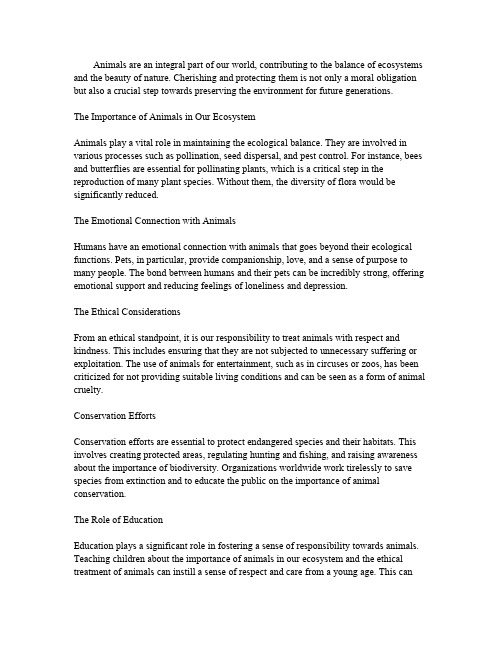
Animals are an integral part of our world,contributing to the balance of ecosystems and the beauty of nature.Cherishing and protecting them is not only a moral obligation but also a crucial step towards preserving the environment for future generations.The Importance of Animals in Our EcosystemAnimals play a vital role in maintaining the ecological balance.They are involved in various processes such as pollination,seed dispersal,and pest control.For instance,bees and butterflies are essential for pollinating plants,which is a critical step in the reproduction of many plant species.Without them,the diversity of flora would be significantly reduced.The Emotional Connection with AnimalsHumans have an emotional connection with animals that goes beyond their ecological functions.Pets,in particular,provide companionship,love,and a sense of purpose to many people.The bond between humans and their pets can be incredibly strong,offering emotional support and reducing feelings of loneliness and depression.The Ethical ConsiderationsFrom an ethical standpoint,it is our responsibility to treat animals with respect and kindness.This includes ensuring that they are not subjected to unnecessary suffering or exploitation.The use of animals for entertainment,such as in circuses or zoos,has been criticized for not providing suitable living conditions and can be seen as a form of animal cruelty.Conservation EffortsConservation efforts are essential to protect endangered species and their habitats.This involves creating protected areas,regulating hunting and fishing,and raising awareness about the importance of anizations worldwide work tirelessly to save species from extinction and to educate the public on the importance of animal conservation.The Role of EducationEducation plays a significant role in fostering a sense of responsibility towards animals. Teaching children about the importance of animals in our ecosystem and the ethical treatment of animals can instill a sense of respect and care from a young age.This canlead to a more compassionate society that values the wellbeing of all living creatures.The Benefits of Interaction with AnimalsInteracting with animals has been shown to have numerous health benefits.Studies have indicated that spending time with animals can reduce stress,lower blood pressure,and improve overall mental health.Animalassisted therapy is used in various settings to help individuals cope with a range of issues,including anxiety and posttraumatic stress disorder.The Cultural SignificanceAnimals have also held cultural significance throughout history.They have been revered in various cultures and religions,symbolizing different aspects of life and the divine.For example,in ancient Egyptian culture,the cat was a symbol of grace and power,while in Hinduism,the cow is considered sacred.The Future of Animal WelfareAs we move forward,it is essential to continue advocating for the welfare of animals. This includes supporting legislation that protects animals from cruelty,promoting sustainable practices in agriculture,and encouraging a shift towards a more compassionate society.The future of animal welfare lies in our hands,and it is up to us to ensure that we leave a world where animals can thrive.In conclusion,cherishing animals is about recognizing their intrinsic value and the irreplaceable role they play in our world.It is about taking action to protect them,learn from them,and live in harmony with them.By doing so,we not only enrich our own lives but also contribute to a healthier,more sustainable planet.。
The Ethics of Animal RightsA Debate for the Ages
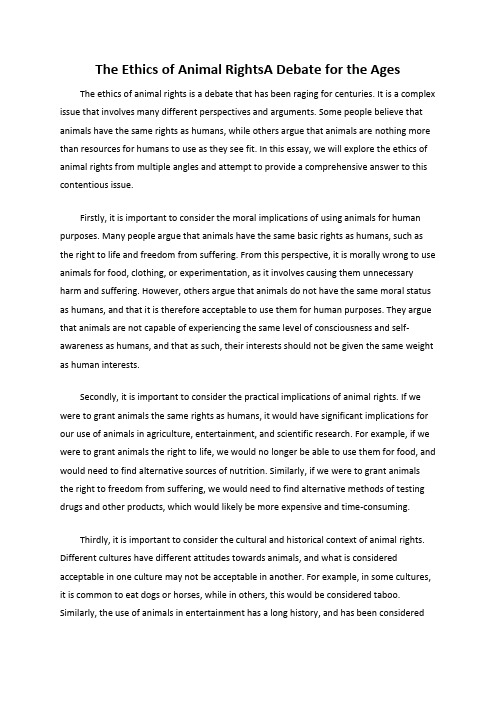
The Ethics of Animal RightsA Debate for the Ages The ethics of animal rights is a debate that has been raging for centuries. It is a complex issue that involves many different perspectives and arguments. Some people believe that animals have the same rights as humans, while others argue that animals are nothing more than resources for humans to use as they see fit. In this essay, we will explore the ethics of animal rights from multiple angles and attempt to provide a comprehensive answer to this contentious issue.Firstly, it is important to consider the moral implications of using animals for human purposes. Many people argue that animals have the same basic rights as humans, such as the right to life and freedom from suffering. From this perspective, it is morally wrong to use animals for food, clothing, or experimentation, as it involves causing them unnecessary harm and suffering. However, others argue that animals do not have the same moral status as humans, and that it is therefore acceptable to use them for human purposes. They argue that animals are not capable of experiencing the same level of consciousness and self-awareness as humans, and that as such, their interests should not be given the same weight as human interests.Secondly, it is important to consider the practical implications of animal rights. If we were to grant animals the same rights as humans, it would have significant implications for our use of animals in agriculture, entertainment, and scientific research. For example, if we were to grant animals the right to life, we would no longer be able to use them for food, and would need to find alternative sources of nutrition. Similarly, if we were to grant animals the right to freedom from suffering, we would need to find alternative methods of testing drugs and other products, which would likely be more expensive and time-consuming.Thirdly, it is important to consider the cultural and historical context of animal rights. Different cultures have different attitudes towards animals, and what is considered acceptable in one culture may not be acceptable in another. For example, in some cultures, it is common to eat dogs or horses, while in others, this would be considered taboo. Similarly, the use of animals in entertainment has a long history, and has been consideredacceptable in many cultures for centuries. It is important to consider these cultural and historical factors when evaluating the ethics of animal rights.Fourthly, it is important to consider the implications of animal rights for human society. If we were to grant animals the same rights as humans, it would fundamentally change our relationship with animals, and would likely have significant implications for human society as a whole. For example, if we were to grant animals the right to life, it would be difficult to justify the killing of animals in self-defense or in defense of human property. Similarly, if we were to grant animals the right to freedom from suffering, it would be difficult to justify the use of animals in scientific research, even if it were for the benefit of human health.Fifthly, it is important to consider the scientific evidence regarding animal consciousness and self-awareness. While it is true that animals are not capable of the same level of consciousness and self-awareness as humans, there is growing evidence that many animals are capable of experiencing pain, suffering, and a range of emotions. This suggests that we should take their interests into account when making decisions about their use.Finally, it is important to consider the practical implications of animal rights for individual animals. Even if we were to grant animals the same rights as humans, it is unlikely that we would be able to eliminate all forms of animal use and exploitation overnight. As such, it is important to consider how we can improve the lives of individual animals in the meantime. This might involve improving the conditions in which animals are kept, reducing the use of animals in certain industries, or promoting the use of alternative methods of testing and research.In conclusion, the ethics of animal rights is a complex and contentious issue that involves many different perspectives and arguments. While there is no easy answer to this question, it is important to consider the moral, practical, cultural, historical, scientific, and individual implications of animal rights when making decisions about their use. By taking a comprehensive and nuanced approach to this issue, we can ensure that we are making ethical and informed decisions about our relationship with animals.。
动物中异类之美英语作文
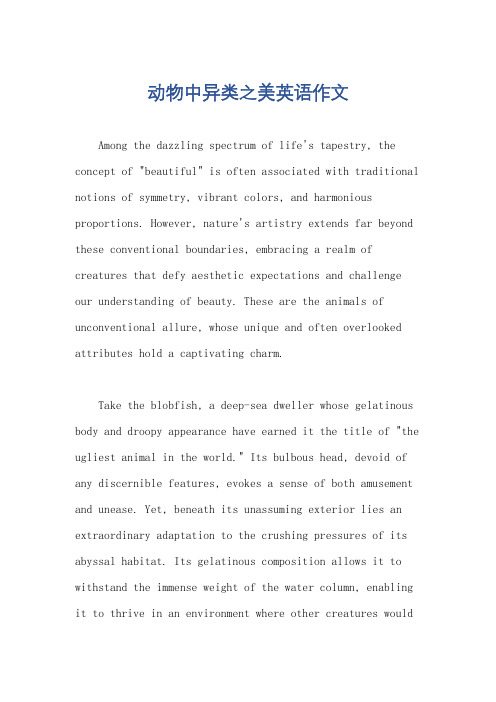
动物中异类之美英语作文Among the dazzling spectrum of life's tapestry, the concept of "beautiful" is often associated with traditional notions of symmetry, vibrant colors, and harmonious proportions. However, nature's artistry extends far beyond these conventional boundaries, embracing a realm of creatures that defy aesthetic expectations and challenge our understanding of beauty. These are the animals of unconventional allure, whose unique and often overlooked attributes hold a captivating charm.Take the blobfish, a deep-sea dweller whose gelatinous body and droopy appearance have earned it the title of "the ugliest animal in the world." Its bulbous head, devoid of any discernible features, evokes a sense of both amusement and unease. Yet, beneath its unassuming exterior lies an extraordinary adaptation to the crushing pressures of its abyssal habitat. Its gelatinous composition allows it to withstand the immense weight of the water column, enabling it to thrive in an environment where other creatures wouldbe crushed.Another creature that confounds conventional beauty standards is the anglerfish. Its disproportionate body, dominated by a gaping maw and a lure that dangles like a fishing rod, is a testament to its bizarre reproductive strategy. The diminutive male anglerfish attaches itself to the much larger female, becoming nothing more than a parasitic appendage, providing sperm when needed. This radical departure from traditional gender roles challenges our preconceived notions of beauty and reproduction.The aye-aye, a nocturnal primate native to Madagascar, possesses an elongated, skeletal finger that it uses to tap on trees, seeking out grubs and insects. Its large, staring eyes, pointed ears, and wiry fur give it an almost extraterrestrial appearance. The aye-aye's unconventional features have led to both fear and superstition, yet they are essential for its survival in its unique habitat.In the realm of insects, beauty takes on an entirely different form. The dung beetle, with its iridescent greenand gold shell, rolls dung into balls that it uses as food and shelter. While its behavior may not be conventionally appealing, its role in the ecosystem is undeniably important. Dung beetles aerate the soil, recycle nutrients, and help control the spread of parasites. Their unassuming beauty lies in their ecological significance.The hagfish, an ancient fish-like creature, is a master of slime. Its slimy eel-like body and toothless mouth secrete copious amounts of slime when threatened, creating a sticky barrier that repels predators. This defensive mechanism may not be visually appealing, but it is highly effective, allowing the hagfish to escape from danger.These are but a few examples of the many animals that defy our conventional notions of beauty. Their unconventional features, bizarre behaviors, and remarkable adaptations are a testament to the boundless creativity of nature. They challenge our aesthetic biases and invite us to appreciate the beauty that lies beyond the familiar.In embracing the unconventional beauty of thesecreatures, we expand our understanding of what it means to be "beautiful." We recognize that beauty is not confined to symmetry, vibrant colors, or traditional forms. It can be found in the unexpected, the unusual, and the extraordinary. By celebrating the beauty of these often-overlooked animals, we celebrate the diversity and wonder of the natural world.。
高一英语动物保护的伦理思考单选题40题
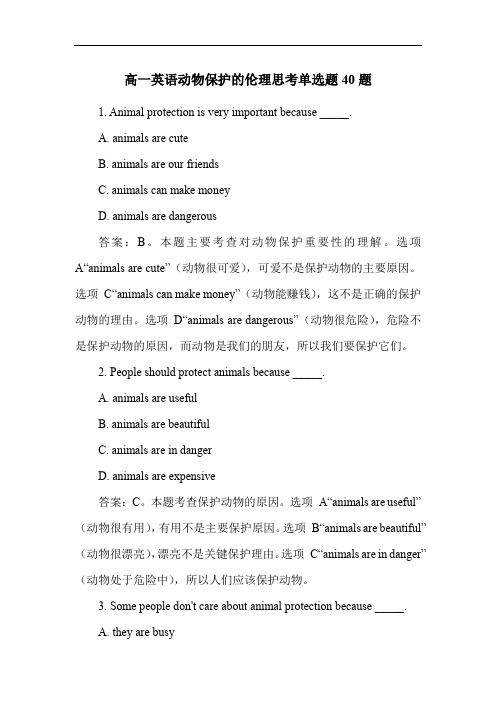
高一英语动物保护的伦理思考单选题40题1. Animal protection is very important because _____.A. animals are cuteB. animals are our friendsC. animals can make moneyD. animals are dangerous答案:B。
本题主要考查对动物保护重要性的理解。
选项A“animals are cute”(动物很可爱),可爱不是保护动物的主要原因。
选项C“animals can make money”(动物能赚钱),这不是正确的保护动物的理由。
选项D“animals are dangerous”(动物很危险),危险不是保护动物的原因,而动物是我们的朋友,所以我们要保护它们。
2. People should protect animals because _____.A. animals are usefulB. animals are beautifulC. animals are in dangerD. animals are expensive答案:C。
本题考查保护动物的原因。
选项A“animals are useful”(动物很有用),有用不是主要保护原因。
选项B“animals are beautiful”(动物很漂亮),漂亮不是关键保护理由。
选项C“animals are in danger”(动物处于危险中),所以人们应该保护动物。
3. Some people don't care about animal protection because _____.A. they are busyB. they don't like animalsC. they think it's not importantD. they don't know how to protect animals答案:C。
环保动物英文作文
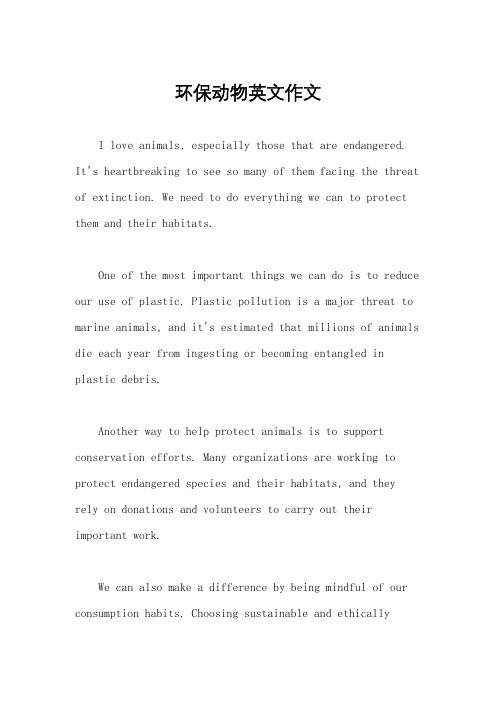
环保动物英文作文I love animals, especially those that are endangered. It's heartbreaking to see so many of them facing the threat of extinction. We need to do everything we can to protect them and their habitats.One of the most important things we can do is to reduce our use of plastic. Plastic pollution is a major threat to marine animals, and it's estimated that millions of animals die each year from ingesting or becoming entangled in plastic debris.Another way to help protect animals is to support conservation efforts. Many organizations are working to protect endangered species and their habitats, and theyrely on donations and volunteers to carry out their important work.We can also make a difference by being mindful of our consumption habits. Choosing sustainable and ethicallysourced products can help reduce the demand for goods that harm animals and their habitats.Educating others about the importance of environmental conservation is also crucial. By spreading awareness and encouraging others to take action, we can help create a more sustainable and wildlife-friendly world.In conclusion, protecting animals and the environment is a responsibility that we all share. By taking small steps in our daily lives and supporting conservation efforts, we can make a big difference for the animals that we love.。
The Ethics of Animal Testing A Complex Issue
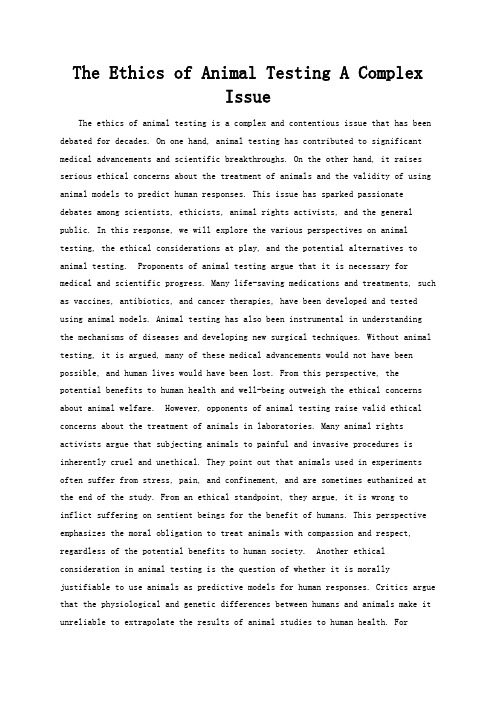
The Ethics of Animal Testing A ComplexIssueThe ethics of animal testing is a complex and contentious issue that has been debated for decades. On one hand, animal testing has contributed to significant medical advancements and scientific breakthroughs. On the other hand, it raises serious ethical concerns about the treatment of animals and the validity of using animal models to predict human responses. This issue has sparked passionate debates among scientists, ethicists, animal rights activists, and the general public. In this response, we will explore the various perspectives on animal testing, the ethical considerations at play, and the potential alternatives to animal testing. Proponents of animal testing argue that it is necessary for medical and scientific progress. Many life-saving medications and treatments, such as vaccines, antibiotics, and cancer therapies, have been developed and tested using animal models. Animal testing has also been instrumental in understanding the mechanisms of diseases and developing new surgical techniques. Without animal testing, it is argued, many of these medical advancements would not have been possible, and human lives would have been lost. From this perspective, the potential benefits to human health and well-being outweigh the ethical concerns about animal welfare. However, opponents of animal testing raise valid ethical concerns about the treatment of animals in laboratories. Many animal rights activists argue that subjecting animals to painful and invasive procedures is inherently cruel and unethical. They point out that animals used in experiments often suffer from stress, pain, and confinement, and are sometimes euthanized at the end of the study. From an ethical standpoint, they argue, it is wrong toinflict suffering on sentient beings for the benefit of humans. This perspective emphasizes the moral obligation to treat animals with compassion and respect, regardless of the potential benefits to human society. Another ethical consideration in animal testing is the question of whether it is morallyjustifiable to use animals as predictive models for human responses. Critics argue that the physiological and genetic differences between humans and animals make it unreliable to extrapolate the results of animal studies to human health. Forexample, many drugs that have shown promising results in animal studies havefailed in human clinical trials, leading to wasted resources and potential harm to human subjects. This raises ethical concerns about the validity and reliability of animal testing as a means of predicting human responses, and whether it is ethically justifiable to continue using animals in this way. In response to these ethical concerns, there have been efforts to develop alternative methods to animal testing. Advances in technology have led to the development of sophisticated in vitro models, computer simulations, and human cell-based assays that can provide more accurate and human-relevant data. These alternatives have the potential to reduce the reliance on animal testing and minimize the suffering of animals in laboratories. From an ethical standpoint, promoting the development and adoption of alternative methods to animal testing aligns with the moral imperative to minimize harm to animals while advancing scientific knowledge. Ultimately, the ethics of animal testing is a complex issue that involves weighing the potential benefits to human health against the ethical considerations of animal welfare and the validity of using animals as predictive models. It is a deeply emotional and morally charged issue that elicits strong reactions from different stakeholders. As we continue to grapple with this issue, it is important to consider the diverse perspectives and engage in thoughtful and respectful dialogue to find ethical and scientifically sound solutions.。
The Ethics of Animal Testing
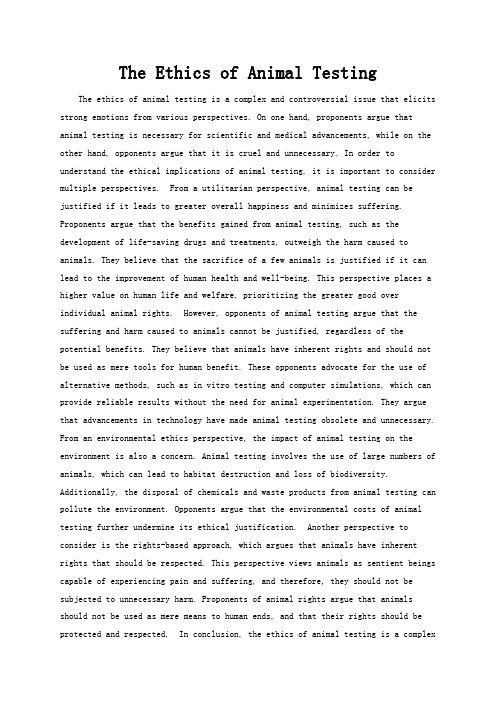
The Ethics of Animal Testing The ethics of animal testing is a complex and controversial issue that elicits strong emotions from various perspectives. On one hand, proponents argue that animal testing is necessary for scientific and medical advancements, while on the other hand, opponents argue that it is cruel and unnecessary. In order to understand the ethical implications of animal testing, it is important to consider multiple perspectives. From a utilitarian perspective, animal testing can be justified if it leads to greater overall happiness and minimizes suffering. Proponents argue that the benefits gained from animal testing, such as the development of life-saving drugs and treatments, outweigh the harm caused to animals. They believe that the sacrifice of a few animals is justified if it can lead to the improvement of human health and well-being. This perspective places a higher value on human life and welfare, prioritizing the greater good over individual animal rights. However, opponents of animal testing argue that the suffering and harm caused to animals cannot be justified, regardless of the potential benefits. They believe that animals have inherent rights and should not be used as mere tools for human benefit. These opponents advocate for the use of alternative methods, such as in vitro testing and computer simulations, which can provide reliable results without the need for animal experimentation. They argue that advancements in technology have made animal testing obsolete and unnecessary. From an environmental ethics perspective, the impact of animal testing on the environment is also a concern. Animal testing involves the use of large numbers of animals, which can lead to habitat destruction and loss of biodiversity. Additionally, the disposal of chemicals and waste products from animal testing can pollute the environment. Opponents argue that the environmental costs of animal testing further undermine its ethical justification. Another perspective to consider is the rights-based approach, which argues that animals have inherent rights that should be respected. This perspective views animals as sentient beings capable of experiencing pain and suffering, and therefore, they should not be subjected to unnecessary harm. Proponents of animal rights argue that animals should not be used as mere means to human ends, and that their rights should be protected and respected. In conclusion, the ethics of animal testing is a complexissue with multiple perspectives. Proponents argue that animal testing is necessary for scientific and medical advancements, while opponents argue that it is cruel and unnecessary. The utilitarian perspective justifies animal testing based on the greater overall happiness and minimization of suffering, while opponents argue for the rights of animals and the use of alternative methods. The environmental impact of animal testing is also a concern. Ultimately, the ethical implications of animal testing require careful consideration and balancing of competing interests.。
The Ethics of Animal Testing

The Ethics of Animal Testing Animal testing has been a controversial topic for decades, sparking heated debates among scientists, ethicists, animal rights activists, and the general public. On one hand, proponents argue that animal testing is necessary for medical and scientific advancements, while opponents emphasize the ethical concerns and the suffering of animals involved. In this essay, we will explore the complex ethical issues surrounding animal testing from multiple perspectives, considering the benefits, drawbacks, and potential alternatives. From a utilitarian perspective, supporters of animal testing argue that the benefits to human health and well-being outweigh the harm caused to animals. Many medical breakthroughs, such as vaccines, medications, and surgical techniques, have been made possible through animal testing. For example, the development of insulin for diabetes, the polio vaccine, and treatments for cancer have all relied on animal research. These advancements have saved countless human lives and improved the quality of life for many individuals. From this viewpoint, the sacrifice of a relatively small number of animals is justified by the greater good it brings to human society. On the other hand, opponents of animal testing argue that the suffering and harminflicted on animals cannot be morally justified, regardless of the potential benefits to humans. Many animal rights activists believe that animals haveintrinsic value and deserve to be treated with respect and compassion, regardless of their utility to humans. The use of animals in experiments, often involving pain, distress, and ultimately death, is seen as a violation of their rights and a form of exploitation. Furthermore, some argue that the results of animal testing are not always applicable to humans, leading to misleading or inconclusive findings. Another perspective to consider is the principle of non-maleficence, which emphasizes the obligation to avoid causing harm. While animal testing has undoubtedly led to significant medical advancements, it also raises ethical concerns about the suffering and harm inflicted on animals. The conditions in which animals are housed and the procedures they undergo can be distressing and painful, raising questions about the ethical treatment of sentient beings. Critics argue that the potential harm to animals should not be disregarded in the pursuit of scientific progress, and that alternative methods should be explored tominimize or eliminate animal suffering. From a virtue ethics standpoint, the character and intentions of those involved in animal testing are central to the ethical evaluation. Proponents of animal testing may argue that researchers and scientists are motivated by a desire to alleviate human suffering and improve health outcomes, reflecting virtues such as compassion and benevolence. However, opponents may question whether the means (using animals in experiments) align with virtuous conduct, and whether there are alternative approaches that better reflect ethical virtues. This perspective invites reflection on the moral character of individuals and the values that guide their actions in the context of animal testing. In addition to ethical considerations, there are practical andscientific concerns about the reliability and relevance of animal testing. Some argue that advancements in technology and research methodologies have rendered animal testing obsolete and that alternative methods, such as in vitro testing and computer modeling, can provide more accurate and human-relevant data. These alternatives not only have the potential to reduce animal suffering but also to improve the predictive value of research outcomes. However, others contend that animal models remain essential for certain types of research, such as understanding complex biological systems and evaluating the safety of new substances. In conclusion, the ethics of animal testing is a complex and contentious issue that elicits strong emotions and diverse perspectives. While proponents emphasize the potential benefits to human health and scientific progress, opponents raise valid concerns about the suffering and moral status of animals involved. As society continues to grapple with these ethical dilemmas, it is important to consider the various perspectives and strive for a balance between promoting human well-being and respecting the rights and welfare of animals. Ultimately, the ethical evaluation of animal testing requires careful consideration of the principles, virtues, and consequences involved, as well as a willingness to explore alternative approaches that align with our moral values.。
The Ethics of Animal Testing
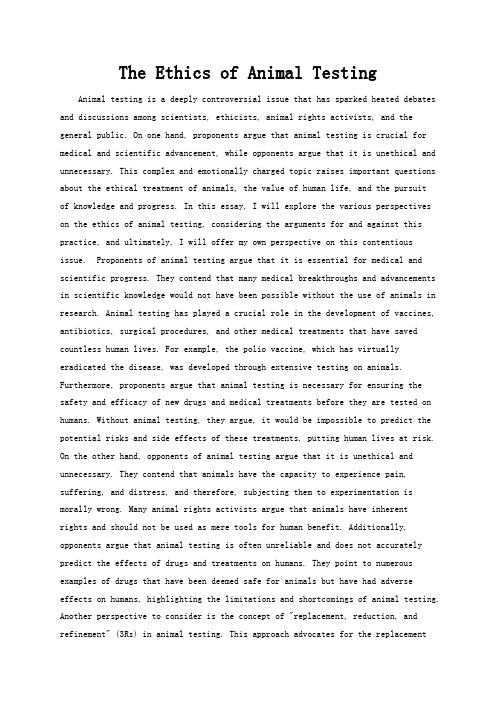
The Ethics of Animal Testing Animal testing is a deeply controversial issue that has sparked heated debates and discussions among scientists, ethicists, animal rights activists, and the general public. On one hand, proponents argue that animal testing is crucial for medical and scientific advancement, while opponents argue that it is unethical and unnecessary. This complex and emotionally charged topic raises important questions about the ethical treatment of animals, the value of human life, and the pursuitof knowledge and progress. In this essay, I will explore the various perspectiveson the ethics of animal testing, considering the arguments for and against this practice, and ultimately, I will offer my own perspective on this contentious issue. Proponents of animal testing argue that it is essential for medical and scientific progress. They contend that many medical breakthroughs and advancementsin scientific knowledge would not have been possible without the use of animals in research. Animal testing has played a crucial role in the development of vaccines, antibiotics, surgical procedures, and other medical treatments that have saved countless human lives. For example, the polio vaccine, which has virtually eradicated the disease, was developed through extensive testing on animals. Furthermore, proponents argue that animal testing is necessary for ensuring the safety and efficacy of new drugs and medical treatments before they are tested on humans. Without animal testing, they argue, it would be impossible to predict the potential risks and side effects of these treatments, putting human lives at risk. On the other hand, opponents of animal testing argue that it is unethical and unnecessary. They contend that animals have the capacity to experience pain, suffering, and distress, and therefore, subjecting them to experimentation is morally wrong. Many animal rights activists argue that animals have inherentrights and should not be used as mere tools for human benefit. Additionally, opponents argue that animal testing is often unreliable and does not accurately predict the effects of drugs and treatments on humans. They point to numerous examples of drugs that have been deemed safe for animals but have had adverseeffects on humans, highlighting the limitations and shortcomings of animal testing. Another perspective to consider is the concept of "replacement, reduction, and refinement" (3Rs) in animal testing. This approach advocates for the replacementof animals with non-animal alternatives, the reduction of the number of animals used in experiments, and the refinement of experimental procedures to minimize animal suffering. Proponents of the 3Rs argue that it is possible to conduct meaningful research and make scientific advancements without the use of animals, and that alternative methods such as computer modeling, cell cultures, and human tissue samples can provide more accurate and reliable results. By embracing the3Rs, they argue, it is possible to uphold ethical standards while still advancing scientific knowledge and medical progress. In considering these various perspectives, it is important to acknowledge the complexity and nuance of theethics of animal testing. On one hand, animal testing has undoubtedly contributed to significant medical advancements and saved countless human lives. However, itis also undeniable that animals have the capacity to experience pain and suffering, and subjecting them to experimentation raises important ethical concerns. As a society, we must grapple with the tension between the pursuit of knowledge and progress, and the ethical treatment of animals. In my own view, I believe that it is possible to strike a balance between the need for scientific advancement andthe ethical treatment of animals. I support the principles of the 3Rs and believe that we should prioritize the development and utilization of non-animalalternatives in research and testing. By embracing alternative methods such as computer modeling, cell cultures, and human tissue samples, we can minimize theuse of animals in experimentation and reduce their suffering. Additionally, I believe that stringent ethical guidelines and regulations should be in place to ensure that animals used in research are treated with respect and compassion, and that their use is justified by the potential benefits to human and animal health. In conclusion, the ethics of animal testing is a complex and contentious issuethat raises important questions about the treatment of animals, the value of human life, and the pursuit of scientific knowledge and progress. While proponents argue that animal testing is essential for medical and scientific advancement, opponents argue that it is unethical and unnecessary. Considering the perspectives of the3Rs, it is possible to strike a balance between the need for scientific advancement and the ethical treatment of animals. Ultimately, it is crucial for society to engage in thoughtful and informed discussions about the ethics ofanimal testing, and to work towards finding ethical and humane solutions that uphold the welfare of animals while still advancing scientific knowledge and medical progress.。
The Ethics of Animal Testing
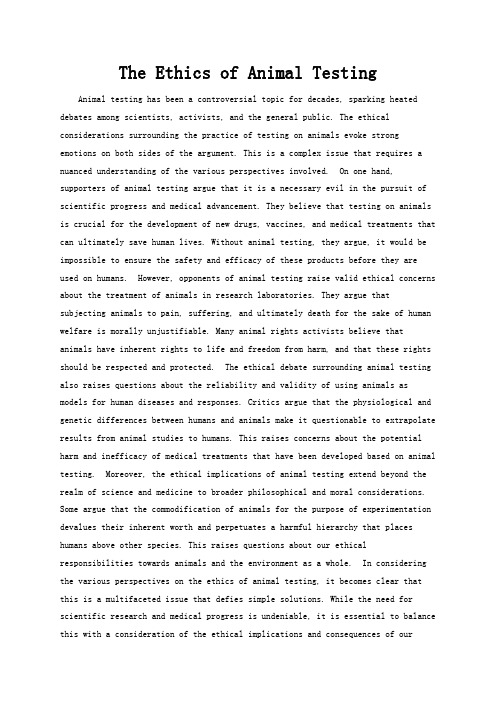
The Ethics of Animal Testing Animal testing has been a controversial topic for decades, sparking heated debates among scientists, activists, and the general public. The ethical considerations surrounding the practice of testing on animals evoke strong emotions on both sides of the argument. This is a complex issue that requires a nuanced understanding of the various perspectives involved. On one hand, supporters of animal testing argue that it is a necessary evil in the pursuit of scientific progress and medical advancement. They believe that testing on animals is crucial for the development of new drugs, vaccines, and medical treatments that can ultimately save human lives. Without animal testing, they argue, it would be impossible to ensure the safety and efficacy of these products before they are used on humans. However, opponents of animal testing raise valid ethical concerns about the treatment of animals in research laboratories. They argue that subjecting animals to pain, suffering, and ultimately death for the sake of human welfare is morally unjustifiable. Many animal rights activists believe that animals have inherent rights to life and freedom from harm, and that these rights should be respected and protected. The ethical debate surrounding animal testing also raises questions about the reliability and validity of using animals as models for human diseases and responses. Critics argue that the physiological and genetic differences between humans and animals make it questionable to extrapolate results from animal studies to humans. This raises concerns about the potential harm and inefficacy of medical treatments that have been developed based on animal testing. Moreover, the ethical implications of animal testing extend beyond the realm of science and medicine to broader philosophical and moral considerations. Some argue that the commodification of animals for the purpose of experimentation devalues their inherent worth and perpetuates a harmful hierarchy that places humans above other species. This raises questions about our ethicalresponsibilities towards animals and the environment as a whole. In considering the various perspectives on the ethics of animal testing, it becomes clear that this is a multifaceted issue that defies simple solutions. While the need for scientific research and medical progress is undeniable, it is essential to balance this with a consideration of the ethical implications and consequences of ouractions. Finding a middle ground that respects both human needs and animal rights is a complex challenge that requires careful deliberation and dialogue among all stakeholders. Ultimately, the ethics of animal testing are a reflection of our values as a society and our commitment to balancing the pursuit of knowledge with compassion and respect for all living beings. As we navigate these complex ethical dilemmas, it is crucial to approach the issue with empathy, openness, and a willingness to engage in thoughtful and respectful debate. Only through a collective effort to consider the diverse perspectives involved can we hope tofind a way forward that is both scientifically rigorous and ethically sound.。
保护貂英语作文
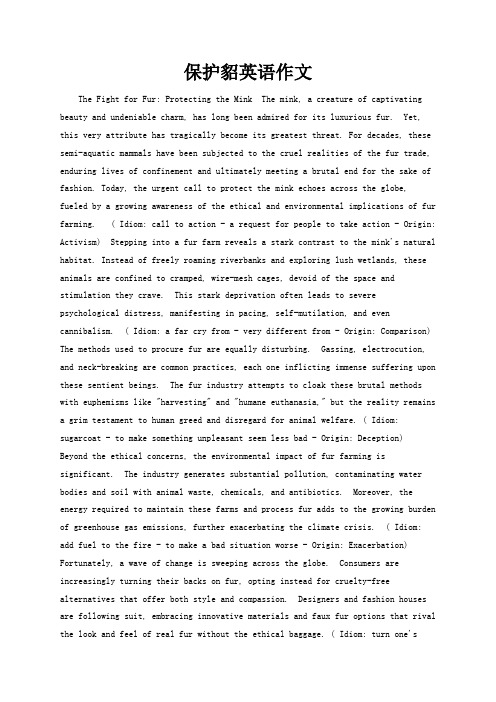
保护貂英语作文The Fight for Fur: Protecting the Mink The mink, a creature of captivating beauty and undeniable charm, has long been admired for its luxurious fur. Yet, this very attribute has tragically become its greatest threat. For decades, these semi-aquatic mammals have been subjected to the cruel realities of the fur trade, enduring lives of confinement and ultimately meeting a brutal end for the sake of fashion. Today, the urgent call to protect the mink echoes across the globe, fueled by a growing awareness of the ethical and environmental implications of fur farming. ( Idiom: call to action - a request for people to take action - Origin: Activism) Stepping into a fur farm reveals a stark contrast to the mink's natural habitat. Instead of freely roaming riverbanks and exploring lush wetlands, these animals are confined to cramped, wire-mesh cages, devoid of the space and stimulation they crave. This stark deprivation often leads to severe psychological distress, manifesting in pacing, self-mutilation, and even cannibalism. ( Idiom: a far cry from - very different from - Origin: Comparison) The methods used to procure fur are equally disturbing. Gassing, electrocution, and neck-breaking are common practices, each one inflicting immense suffering upon these sentient beings. The fur industry attempts to cloak these brutal methods with euphemisms like "harvesting" and "humane euthanasia," but the reality remains a grim testament to human greed and disregard for animal welfare. ( Idiom: sugarcoat - to make something unpleasant seem less bad - Origin: Deception) Beyond the ethical concerns, the environmental impact of fur farming is significant. The industry generates substantial pollution, contaminating water bodies and soil with animal waste, chemicals, and antibiotics. Moreover, the energy required to maintain these farms and process fur adds to the growing burden of greenhouse gas emissions, further exacerbating the climate crisis. ( Idiom: add fuel to the fire - to make a bad situation worse - Origin: Exacerbation) Fortunately, a wave of change is sweeping across the globe. Consumers are increasingly turning their backs on fur, opting instead for cruelty-free alternatives that offer both style and compassion. Designers and fashion houses are following suit, embracing innovative materials and faux fur options that rival the look and feel of real fur without the ethical baggage. ( Idiom: turn one'sback on - to reject or abandon something - Origin: Rejection) Governments arealso stepping up, with several countries implementing bans on fur farming. These legislative measures reflect a growing recognition of the inherent cruelty of the fur trade and its incompatibility with modern values of animal welfare and environmental sustainability. ( Idiom: step up - to take action or responsibility - Origin: Action) The fight for fur is far from over. Yet, the growing momentum of the anti-fur movement offers a glimmer of hope for the future. By choosing compassion over cruelty, and sustainability over fleeting trends, we can create a world where mink and other fur-bearing animals are no longer seen as commodities but as fellow beings deserving of respect and protection. ( Idiom: a glimmer of hope - a small sign that things might improve - Origin: Hope) Let us remember, true luxury lies not in the fur of an animal but in the compassion we extend toall living creatures. In the words of Mahatma Gandhi, "The greatness of a nation and its moral progress can be judged by the way its animals are treated." ( Idiom: moral progress - improvement in moral standards - Origin: Ethics)。
The Ethics of Animal Testing
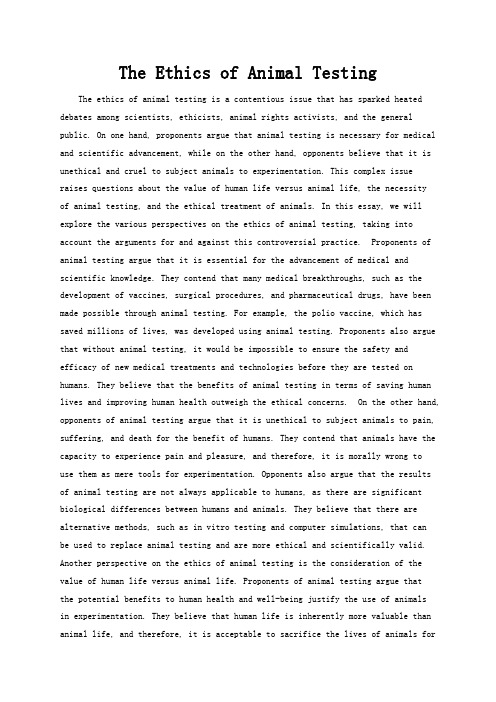
The Ethics of Animal Testing The ethics of animal testing is a contentious issue that has sparked heated debates among scientists, ethicists, animal rights activists, and the general public. On one hand, proponents argue that animal testing is necessary for medical and scientific advancement, while on the other hand, opponents believe that it is unethical and cruel to subject animals to experimentation. This complex issue raises questions about the value of human life versus animal life, the necessityof animal testing, and the ethical treatment of animals. In this essay, we will explore the various perspectives on the ethics of animal testing, taking into account the arguments for and against this controversial practice. Proponents of animal testing argue that it is essential for the advancement of medical and scientific knowledge. They contend that many medical breakthroughs, such as the development of vaccines, surgical procedures, and pharmaceutical drugs, have been made possible through animal testing. For example, the polio vaccine, which has saved millions of lives, was developed using animal testing. Proponents also argue that without animal testing, it would be impossible to ensure the safety and efficacy of new medical treatments and technologies before they are tested on humans. They believe that the benefits of animal testing in terms of saving human lives and improving human health outweigh the ethical concerns. On the other hand, opponents of animal testing argue that it is unethical to subject animals to pain, suffering, and death for the benefit of humans. They contend that animals have the capacity to experience pain and pleasure, and therefore, it is morally wrong touse them as mere tools for experimentation. Opponents also argue that the results of animal testing are not always applicable to humans, as there are significant biological differences between humans and animals. They believe that there are alternative methods, such as in vitro testing and computer simulations, that canbe used to replace animal testing and are more ethical and scientifically valid. Another perspective on the ethics of animal testing is the consideration of the value of human life versus animal life. Proponents of animal testing argue thatthe potential benefits to human health and well-being justify the use of animalsin experimentation. They believe that human life is inherently more valuable than animal life, and therefore, it is acceptable to sacrifice the lives of animals forthe greater good of humanity. On the other hand, opponents argue that all sentient beings, including animals, have inherent value and deserve to be treated with respect and compassion. They believe that it is not justifiable to prioritize human interests over the interests of animals, and that the suffering of animals should be minimized as much as possible. In addition to the ethical considerations, there are also legal and regulatory aspects to the debate on animal testing. In many countries, there are laws and regulations in place that govern the use of animals in research and testing. These laws often require researchers to minimize the pain and suffering of animals, use the smallest number of animals possible, and consider alternative methods to animal testing. However, there are also critics who argue that these laws are not always effectively enforced, and that there is a need for stronger regulations to ensure the ethical treatment of animals in research. Furthermore, the public opinion on the ethics of animal testing plays a significant role in shaping the policies and practices surrounding this issue. There is a growing awareness and concern among the general public about the welfare of animals used in research, which has led to increased pressure on companies and researchers to find alternative methods to animal testing. Many consumers are choosing to support cruelty-free products and companies that do not conduct animal testing, which has led to a shift in the market towards more ethical practices. This demonstrates the power of public opinion in influencing the ethical considerations of animal testing. In conclusion, the ethics of animal testing is a complex and multifaceted issue that raises questions about the value of human life versus animal life, the necessity of animal testing, and the ethical treatment of animals. Proponents argue that animal testing is necessary for medical and scientific advancement, while opponents believe that it is unethical and cruel to subject animals to experimentation. There are also considerations of the value of human life versus animal life, legal and regulatory aspects, and public opinion that shape the debate on animal testing. Ultimately, the ethics of animal testing requires a careful consideration of the moral, scientific, and societal implications, and a balancing of the interests of humans and animals.。
The Ethics of Animal Testing
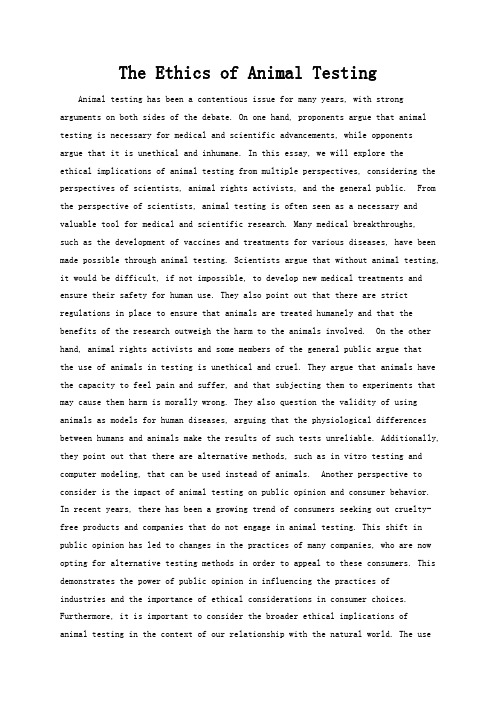
The Ethics of Animal Testing Animal testing has been a contentious issue for many years, with strong arguments on both sides of the debate. On one hand, proponents argue that animal testing is necessary for medical and scientific advancements, while opponentsargue that it is unethical and inhumane. In this essay, we will explore theethical implications of animal testing from multiple perspectives, considering the perspectives of scientists, animal rights activists, and the general public. From the perspective of scientists, animal testing is often seen as a necessary and valuable tool for medical and scientific research. Many medical breakthroughs,such as the development of vaccines and treatments for various diseases, have been made possible through animal testing. Scientists argue that without animal testing, it would be difficult, if not impossible, to develop new medical treatments and ensure their safety for human use. They also point out that there are strict regulations in place to ensure that animals are treated humanely and that the benefits of the research outweigh the harm to the animals involved. On the other hand, animal rights activists and some members of the general public argue thatthe use of animals in testing is unethical and cruel. They argue that animals have the capacity to feel pain and suffer, and that subjecting them to experiments that may cause them harm is morally wrong. They also question the validity of using animals as models for human diseases, arguing that the physiological differences between humans and animals make the results of such tests unreliable. Additionally, they point out that there are alternative methods, such as in vitro testing and computer modeling, that can be used instead of animals. Another perspective to consider is the impact of animal testing on public opinion and consumer behavior. In recent years, there has been a growing trend of consumers seeking out cruelty-free products and companies that do not engage in animal testing. This shift in public opinion has led to changes in the practices of many companies, who are now opting for alternative testing methods in order to appeal to these consumers. This demonstrates the power of public opinion in influencing the practices ofindustries and the importance of ethical considerations in consumer choices. Furthermore, it is important to consider the broader ethical implications ofanimal testing in the context of our relationship with the natural world. The useof animals in research raises questions about our responsibility towards other species and the environment. It forces us to confront the ethical dimensions of our actions and the ways in which we value and prioritize different forms of life. This broader perspective challenges us to think about the ways in which we can conduct research and advance scientific knowledge without causing harm to other living beings. In conclusion, the ethics of animal testing is a complex and multifaceted issue that requires careful consideration from multiple perspectives. While there are valid arguments on both sides of the debate, it is important to weigh the potential benefits of animal testing against the ethical concerns and to explore alternative methods that can achieve the same scientific goals without causing harm to animals. Ultimately, the ethical implications of animal testing call for a thoughtful and nuanced approach that takes into account the perspectives of scientists, animal rights activists, and the general public, as well as the broader ethical considerations of our relationship with the natural world.。
The Ethics of Animal Rights A Debate for the Ages
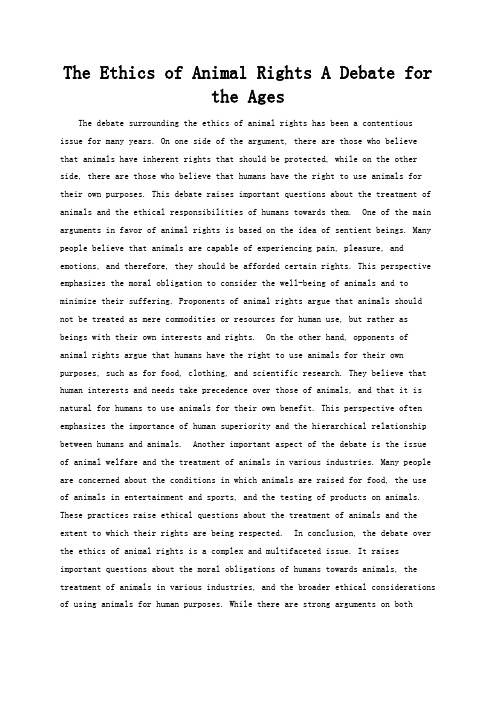
The Ethics of Animal Rights A Debate forthe AgesThe debate surrounding the ethics of animal rights has been a contentious issue for many years. On one side of the argument, there are those who believethat animals have inherent rights that should be protected, while on the other side, there are those who believe that humans have the right to use animals for their own purposes. This debate raises important questions about the treatment of animals and the ethical responsibilities of humans towards them. One of the main arguments in favor of animal rights is based on the idea of sentient beings. Many people believe that animals are capable of experiencing pain, pleasure, and emotions, and therefore, they should be afforded certain rights. This perspective emphasizes the moral obligation to consider the well-being of animals and to minimize their suffering. Proponents of animal rights argue that animals should not be treated as mere commodities or resources for human use, but rather as beings with their own interests and rights. On the other hand, opponents of animal rights argue that humans have the right to use animals for their own purposes, such as for food, clothing, and scientific research. They believe that human interests and needs take precedence over those of animals, and that it is natural for humans to use animals for their own benefit. This perspective often emphasizes the importance of human superiority and the hierarchical relationship between humans and animals. Another important aspect of the debate is the issueof animal welfare and the treatment of animals in various industries. Many people are concerned about the conditions in which animals are raised for food, the useof animals in entertainment and sports, and the testing of products on animals. These practices raise ethical questions about the treatment of animals and the extent to which their rights are being respected. In conclusion, the debate over the ethics of animal rights is a complex and multifaceted issue. It raises important questions about the moral obligations of humans towards animals, the treatment of animals in various industries, and the broader ethical considerations of using animals for human purposes. While there are strong arguments on bothsides of the debate, it is clear that the ethical treatment of animals is an issue that deserves careful consideration and thoughtful debate.。
The Ethics of Animal Testing A Complex Issue

The Ethics of Animal Testing A ComplexIssueThe ethics of animal testing is a complex and controversial issue that has been debated for decades. On one hand, animal testing has contributed to numerous medical and scientific advancements, saving countless human lives. On the other hand, it raises ethical concerns about the treatment of animals and the validity of using animals as proxies for humans in research. This essay will explore the various perspectives on animal testing, including its benefits, ethical implications, and potential alternatives. From a utilitarian perspective, the benefits of animal testing are undeniable. Many life-saving medical treatments and procedures, such as vaccines, surgical techniques, and medications, have been developed and improved through animal testing. This has led to significant improvements in human health and longevity, making it difficult to argue against the practical benefits of animal testing. For example, the development of insulin for diabetes, which relied on animal testing, has saved millions of lives around the world. From this viewpoint, the ends justify the means, as the suffering of a relatively small number of animals is outweighed by the potential benefits to human society as a whole. However, the deontological perspective raises ethical concerns about the treatment of animals as mere means to an end. This perspective emphasizes the intrinsic value of all living beings and argues that it is inherently wrong to cause harm or suffering to animals, regardless of thepotential benefits to humans. This raises questions about the morality of using animals in experiments that may cause them pain and distress. For example, the use of animals in cosmetics testing, where substances are applied to their skin or eyes to assess potential harm, is widely condemned as unnecessary and cruel. From this perspective, the ethical implications of animal testing cannot be ignored, and alternative methods should be sought to avoid causing harm to animals. Another perspective to consider is the concept of speciesism, which is the belief that humans are inherently superior to other animals and therefore have the right to use them for their own purposes. This perspective challenges the ethical justification for animal testing, arguing that it is based on a biased and unjusthierarchy that prioritizes human interests over the well-being of other species. From this viewpoint, the use of animals in research is a form of discriminationthat perpetuates the exploitation and mistreatment of non-human animals. It calls for a reevaluation of our moral obligations to animals and the development of more ethical and compassionate approaches to scientific research. In response to these ethical concerns, there has been a growing movement towards the development anduse of alternative methods to animal testing. These methods include in vitro studies using human cells and tissues, computer modeling, and human clinicaltrials. While these alternatives may not completely replace the need for animal testing, they offer promising opportunities to reduce the number of animals usedin research and minimize their suffering. The development of these alternatives reflects a shift towards a more ethical and humane approach to scientific research, acknowledging the moral status of animals and seeking to minimize harm to them.In conclusion, the ethics of animal testing is a complex and multifaceted issuethat elicits strong emotions and ethical considerations. While animal testing has undoubtedly contributed to significant medical and scientific advancements, it raises important ethical concerns about the treatment of animals and the validity of using them as proxies for humans. It is important to consider the various perspectives on this issue, including the utilitarian benefits, deontological ethical implications, and the concept of speciesism. Additionally, the development of alternative methods to animal testing offers promising opportunities tominimize harm to animals and develop more ethical approaches to scientific research. Ultimately, the ethics of animal testing requires a careful balance of the potential benefits to humans with the moral considerations for the well-being of animals.。
Ethics of Animal Rights

Ethics of Animal RightsThe ethics of animal rights is a complex and contentious issue that has sparked heated debates and passionate discussions among people from all walks of life. On one hand, there are those who argue that animals deserve the same rights and protections as humans, while on the other hand, there are those who believe that humans have the right to use animals for their own purposes. This debate raises important questions about the moral and ethical responsibilities that humans have towards animals, and it forces us to confront the ways in which we interact with and treat the other species that share our planet. One perspective on the ethics of animal rights is that animals are sentient beings who are capable of experiencing pain, pleasure, and a range of emotions. This perspective argues that because animals are able to suffer, they deserve to be treated with compassion and respect, and that they should be afforded certain rights and protections. Advocates for this perspective often point to the cruel and inhumane treatment of animals in industries such as factory farming, animal testing, and entertainment as evidence of the urgent need for stronger animal rights laws and regulations. They argue that animals should not be seen as mere commodities or resources for human use, but as individuals with their own inherent value and rights. On the other hand, there are those who argue that humans have the right to use animals for their own purposes, whether it be for food, clothing,scientific research, or entertainment. This perspective often emphasizes the importance of human interests and needs, and it contends that the use of animals is justified as long as it is done in a humane and responsible manner. Proponents of this perspective may argue that animals are not equal to humans and that it is natural for humans to use animals for their own benefit. They may also point to the role that animals play in various industries and the ways in which their use benefits human society as a whole. Another important aspect of the ethics of animal rights is the concept of speciesism, which is the belief that one species is inherently superior to others and therefore has the right to dominate and exploit them. This concept is often used to critique the ways in which humanstreat animals, and it challenges us to examine the ways in which we privilege our own species over others. Proponents of animal rights often argue that speciesismis a form of discrimination that is similar to racism or sexism, and that it is morally wrong to treat animals as if they are inferior to humans. In addition to these perspectives, there are also religious and cultural beliefs that influence the way in which people think about the ethics of animal rights. For example, some religions teach that humans have a responsibility to be good stewards of the earth and to treat animals with kindness and compassion. On the other hand, there are cultures that have long-standing traditions of using animals for food, clothing, and other purposes, and these traditions can influence the way in which people view the rights and treatment of animals. Ultimately, the ethics of animal rights is a complex and multifaceted issue that requires us to consider a wide range of perspectives and arguments. It forces us to confront our own beliefs and values, and it challenges us to think critically about the ways in which we interact with and treat the other species that share our planet. While there may not be a simple or straightforward answer to the question of animal rights, it is clear that this is an issue that demands our attention and consideration as we strive to create a more just and compassionate world for all beings.。
The Ethics of Animal Rights A Debate for the Ages
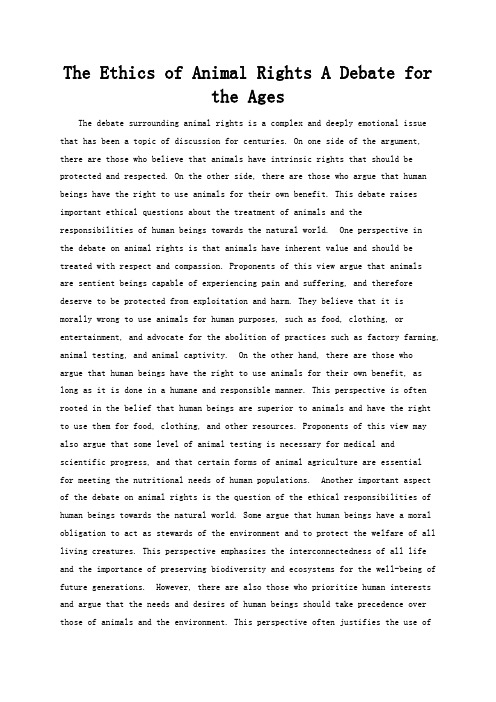
The Ethics of Animal Rights A Debate forthe AgesThe debate surrounding animal rights is a complex and deeply emotional issue that has been a topic of discussion for centuries. On one side of the argument, there are those who believe that animals have intrinsic rights that should be protected and respected. On the other side, there are those who argue that human beings have the right to use animals for their own benefit. This debate raises important ethical questions about the treatment of animals and theresponsibilities of human beings towards the natural world. One perspective inthe debate on animal rights is that animals have inherent value and should be treated with respect and compassion. Proponents of this view argue that animalsare sentient beings capable of experiencing pain and suffering, and therefore deserve to be protected from exploitation and harm. They believe that it ismorally wrong to use animals for human purposes, such as food, clothing, or entertainment, and advocate for the abolition of practices such as factory farming, animal testing, and animal captivity. On the other hand, there are those whoargue that human beings have the right to use animals for their own benefit, as long as it is done in a humane and responsible manner. This perspective is often rooted in the belief that human beings are superior to animals and have the right to use them for food, clothing, and other resources. Proponents of this view may also argue that some level of animal testing is necessary for medical andscientific progress, and that certain forms of animal agriculture are essentialfor meeting the nutritional needs of human populations. Another important aspect of the debate on animal rights is the question of the ethical responsibilities of human beings towards the natural world. Some argue that human beings have a moral obligation to act as stewards of the environment and to protect the welfare of all living creatures. This perspective emphasizes the interconnectedness of all life and the importance of preserving biodiversity and ecosystems for the well-being of future generations. However, there are also those who prioritize human interests and argue that the needs and desires of human beings should take precedence over those of animals and the environment. This perspective often justifies the use ofanimals and the exploitation of natural resources as necessary for human survival and progress. Proponents of this view may prioritize economic development and human welfare over environmental conservation and animal rights. In conclusion, the debate on animal rights is a deeply complex and emotionally charged issue that raises important ethical questions about the treatment of animals and the responsibilities of human beings towards the natural world. While some argue that animals have inherent value and deserve to be protected from exploitation, others prioritize human interests and argue that the use of animals and natural resources is necessary for human survival and progress. Ultimately, finding a balance between these competing perspectives is essential for creating a more ethical and sustainable relationship between human beings, animals, and the environment.。
The Ethics of Animal Testing
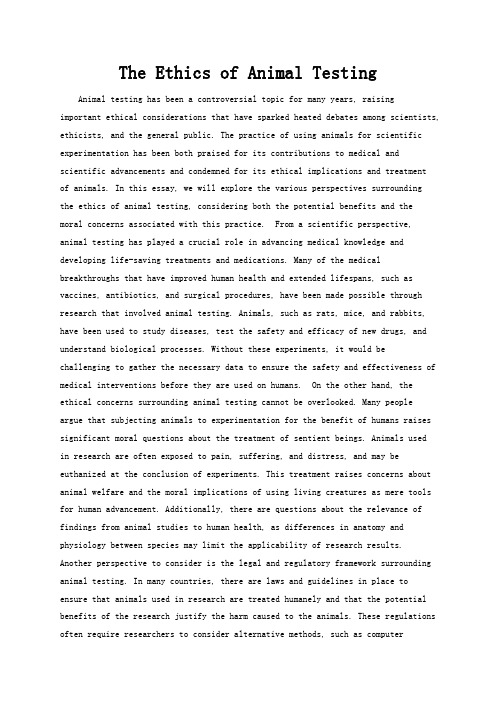
The Ethics of Animal Testing Animal testing has been a controversial topic for many years, raisingimportant ethical considerations that have sparked heated debates among scientists, ethicists, and the general public. The practice of using animals for scientific experimentation has been both praised for its contributions to medical andscientific advancements and condemned for its ethical implications and treatmentof animals. In this essay, we will explore the various perspectives surroundingthe ethics of animal testing, considering both the potential benefits and themoral concerns associated with this practice. From a scientific perspective, animal testing has played a crucial role in advancing medical knowledge and developing life-saving treatments and medications. Many of the medical breakthroughs that have improved human health and extended lifespans, such as vaccines, antibiotics, and surgical procedures, have been made possible through research that involved animal testing. Animals, such as rats, mice, and rabbits, have been used to study diseases, test the safety and efficacy of new drugs, and understand biological processes. Without these experiments, it would bechallenging to gather the necessary data to ensure the safety and effectiveness of medical interventions before they are used on humans. On the other hand, the ethical concerns surrounding animal testing cannot be overlooked. Many peopleargue that subjecting animals to experimentation for the benefit of humans raises significant moral questions about the treatment of sentient beings. Animals usedin research are often exposed to pain, suffering, and distress, and may be euthanized at the conclusion of experiments. This treatment raises concerns about animal welfare and the moral implications of using living creatures as mere tools for human advancement. Additionally, there are questions about the relevance of findings from animal studies to human health, as differences in anatomy and physiology between species may limit the applicability of research results. Another perspective to consider is the legal and regulatory framework surrounding animal testing. In many countries, there are laws and guidelines in place toensure that animals used in research are treated humanely and that the potential benefits of the research justify the harm caused to the animals. These regulations often require researchers to consider alternative methods, such as computermodeling and cell cultures, before resorting to animal studies. However, enforcement and compliance with these regulations vary, and there are ongoing debates about the adequacy of current standards for protecting animal welfare in research settings. Furthermore, the public's attitude toward animal testing has a significant impact on the ethical considerations surrounding this practice. While some individuals are willing to accept the use of animals in research if it leads to medical progress, others are staunchly opposed to any form of animal experimentation, advocating for alternative research methods that do not involve animals. Public opinion and activism have influenced the policies of companies and research institutions, leading to increased efforts to reduce, refine, and replace the use of animals in scientific experiments. In conclusion, the ethics of animal testing is a complex and contentious issue that requires careful consideration of the potential benefits, moral concerns, legal regulations, and public attitudes. While animal testing has contributed to significant scientific and medical advancements, the ethical implications of using animals in research cannot be ignored. As technology and scientific methods continue to advance, it is essential to explore alternative research approaches that minimize the use of animals while still advancing human knowledge and improving health outcomes. Ultimately, the ethical considerations surrounding animal testing require ongoing dialogue and critical evaluation to ensure that scientific progress is balanced with ethical responsibility towards the welfare of animals.。
- 1、下载文档前请自行甄别文档内容的完整性,平台不提供额外的编辑、内容补充、找答案等附加服务。
- 2、"仅部分预览"的文档,不可在线预览部分如存在完整性等问题,可反馈申请退款(可完整预览的文档不适用该条件!)。
- 3、如文档侵犯您的权益,请联系客服反馈,我们会尽快为您处理(人工客服工作时间:9:00-18:30)。
Aesthetic Merit and Autonomy
• Another reason aesthetic discrimination is problematic is that much beauty is beyond the individual’s control and thus:
Hale Waihona Puke Consider the beauty of birds
The bright flash of a cardinal against the deep green leaves
The charm of the male feeding his female companion
The haunting call of the loon
Endangered species discrimination? • The policy of preserving attractive endangered species before less attractive ones seems to run afoul of the moral equality of animals
•
•
•
Two objections to animal aesthetic preservation
• Focus on animal beauty is superficial and morally objectionable
• As it is with people, aesthetic merit is a trivial and inappropriate basis on which to value or protect animals
• The meaning and significance of moral equality for animals is even less well understood
Leave implications of moral equality for aesthetic discrimination unresolved
• And if human beauty is valuable, should it not count for something in our thinking and behavior? • People often choose a spouse or friends based in part on their beauty and this does not seem morally objectionable or superficial
• Both are significant problems if one takes the moral status of animals seriously.
Is beauty an objectionable basis for treatment/valuing of humans & animals?
• Moral considerations do not always outweigh aesthetic ones
• Boring life of Mr. Goody-two-shoes is not preferable to the life of a person whose life--though not perfectly moral--is highly aesthetically stimulating • In the conflict between salmon and sea lions, even though salmon are less sentient and thus less morally considerable, salmon may get preference because of their spectacular life cycle (superior aesthetic merit)
• (1) It is unfair to base our treatment of others on such a feature, for we should base our treatment of others on characteristics for which they are responsible • (2) Evaluating others on basis of uncontrollable features reduces their control over their lives (reduces autonomy)
Animal Beauty, Ethics, and Environmental Preservation
Ned Hettinger College of Charleston
Animal beauty is a paradigm of aesthetic value
What could be more graceful than a gazelle?
Physically attractive humans are treated better
• More successful in virtually every area of human life • Jobs, friends, spouses, being elected . . .
Uncontroversial that some of this preferential treatment is problematic
• If a bird rescue operation chooses to rehabilitate hawks, eagles, and owls, but not vultures, and does so on aesthetic grounds, does it violate the requirement of equal consideration for all animals?
• Does choosing a pet at the pound based on aesthetics violate equal consideration of animals?
Moral equality not well understood
• The meaning and significance of moral equality in humans is problematic
– Many argue for partiality as a moral ideal – If and when moral equality rules out meritocratic treatment (including aesthetic discrimination) is also up for grabs
• Predation is ugly
• Widespread suffering, death, and predation of animals is aesthetically negative and compromises animal beauty’s role in aesthetic protectionism
• “Moral education” is needed to “correct for such biases” (Robert Fudge, JAAC, 2001) • A focus on human physical attractiveness is superficial:
• When we “shower many rewards on people–models, movie stars–who are beautiful or who make themselves beautiful” we should “feel a little ashamed of it, thinking it a little silly and a waste of resources” • “Things we do to maintain our own beauty are associated with disreputable traits like vanity” (Rob Loftis 2003, PCW)
Not easy to explain why aesthetic discrimination is problematic
• Given that beauty is paradigmatically valuable, why is human beauty not also uncontroversially valuable?
Does Aesthetic Discrimination Violate Moral Equality?
• One objection to using aesthetic merit to value and differentially treat people (and animals) is that it violates the ideal of moral equality
• E.g., Beauty queens should not get better medial treatment or fairer trials
Does the moral equality of animals prevent similar aesthetic discrimination?
Beauty not always uncontrollable
• Note that these arguments don’t apply for the many dimensions of beauty that are controllable • When an appearance that repulses others is chosen (e.g., dirty, smelly, gluttonous, etc) • Differential treatment on this basis is neither unfair nor autonomy reducing
